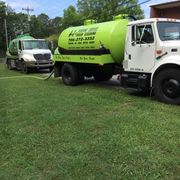Can Your Septic System Make You Sick?

A septic system filters wastewater, essentially “recycling” the liquid, so it reaches groundwater free of contaminants. However, the efficient yet delicate system becomes a health hazard when it fails. Learn about the unpleasant ways septic problems affect your health and how to take even better care of the waste management system.
Can a Failing Septic System Make Me & My Family Ill?
How a Failing Septic System Can Cause Illness
If a septic tank isn’t pumped regularly, it becomes overloaded with solid waste. That waste can back up into household plumbing, emanating methane gas, among other toxic gases such as carbon monoxide, carbon dioxide, ammonia, and nitrogen oxide. You may notice a rotten egg-like odor, causing everyone in your home to wrinkle their noses. Without immediate servicing, toxic fumes cause lung, throat, eye, and nose irritation, as well as a loss of consciousness and asphyxiation. Prolonged exposure can cause permanent lung damage.
Full-blown sewage backups present further septic system health risks, as sewage contains a wide variety of pathogens, viruses, and bacteria. Parasite infections from sewage exposure can include tapeworms and hookworms, while viruses include gastroenteritis and hepatitis A. Bacterial infection risks include E. coli and salmonellosis.
How to Prevent Problems
 Prevention holds the key to sidestepping septic system failures and related health risks. Have your tank pumped every two to five years in light of household member numbers, and avoid flushing anything that can clog the tank or kill bacterial enzymes that break down solid waste. Tank additives, coffee grounds, paper, feminine products, household chemicals, and cigarette butts are among the top offenders.
Prevention holds the key to sidestepping septic system failures and related health risks. Have your tank pumped every two to five years in light of household member numbers, and avoid flushing anything that can clog the tank or kill bacterial enzymes that break down solid waste. Tank additives, coffee grounds, paper, feminine products, household chemicals, and cigarette butts are among the top offenders.
Avoid further septic problems by marking the tank and drainfield locations to prevent parking over them, which causes tank cracks and compacted soil. Ensure all trees and shrubs are planted at least 20 feet away from the system since roots look for nearby water sources and can clog the perforated pipes connecting the tank and drainfield, as well as the drainfield itself. Watch weekly water usage to prevent overwhelming the tank and possibly causing plumbing backups and solids in the drainfield.
Keep your septic system functional with services from A-1 Pumping Service and Drain Cleaning. Serving Whitfield County and the surrounding areas in Georgia for 23 years, this family-owned, state-licensed business offers honest evaluations and upfront pricing. Call (706) 272-3352 to make an appointment or visit the website for septic service information. Follow the company on Twitter for septic maintenance tips.
About the Business
Have a question? Ask the experts!
Send your question

